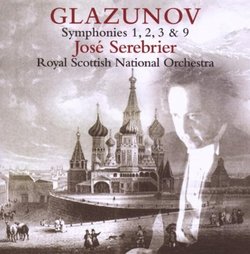| All Artists: José Serebrier Title: Glazunov Symphony Nos. 1, 2, 3 & 9 Members Wishing: 0 Total Copies: 0 Label: Warner Classics Original Release Date: 1/1/2009 Re-Release Date: 8/25/2009 Album Type: Import Genre: Classical Style: Number of Discs: 1 SwapaCD Credits: 1 UPC: 825646890422 |
Search - José Serebrier :: Glazunov Symphony Nos. 1, 2, 3 & 9
CD DetailsSimilar CDs
|
CD ReviewsThe Glazunov/Serebrier Symphony cycle at its glorious conclu David A. Hollingsworth | Washington, DC USA | 09/08/2009 (5 out of 5 stars) "A bit close to a decade ago, I confessed to a friend and fellow reviewer, Julian Grant, who graced these Amazon pages with his own informative and thought-provoking reviews I took the pleasure in reading, of how dissatisfied I was in music programmes particularly in America's concert halls. I was ranting about how too little we were exposed to the great composers like Glazunov, Atterberg, Nielsen, Popov, Myaskovsky, and others and the need to rectify that in part by not overplaying the familiar Tchaikovsky, Mahler, Beethoven, et al. in these halls. But Julian Grant put the matter into perspective in reminding me that repeated listening is a complex ingredient in music appreciation. It is indeed amazing, now that I am thinking about it, of how reactions to a piece differ upon subsequent hearings whether in concerts or in one's living room, especially when new performers have something differently to say. The over-playing issue is of course a legitimate one (still), but as demonstrated here in these recordings, the repeated-listening phenomenon, and what it yields, is ever so true. José Serebrier's rendition of Glazunov's Third Symphony is the highlight in this two discs album and to my mind, the pinnacle achievement of this set (not forgetting even for a moment how wonderful Serebrier is in the composer's other symphonies like, for instances, the Fourth, the Sixth or even the Ninth here). Other than Vernon Handley's take in Bax's Fourth Symphony (Chandos) or Rasilainen's take in Atterberg's Second (CPO), or even Botstein's way with Popov's First (Telarc), rarely do I have the opportunity in listening to a recording that so altered the way I perceived and viewed a particular work especially in the least expected. Here, there is no exception. And now, I am even more hesitant to view the composer's Third Symphony as the weakest of the bunch. Written in 1890 and dedicated to Tchaikovsky himself, Glazunov's was evidently concerned with broadening his musical scope, its persona, its appeal, and its language. But as in Sibelius' Third Symphony (1907), it was a difficult piece to bring off (and Glazunov's constant complaining annoyed Rimsky-Korsakov like something terrible). Nevertheless, Glazunov did manage to finish the work, and while its longwindedness is still apparent, Serebrier mitigates much of it with his `off to the races', no nonsense of an approach. And yet, this great maestro still have the predisposition for the imagination (like in the scherzo) and this remarkable Royal Scottish National Orchestra (RSNO) meets him all the way with plenty of verve and pure artistry throughout. From the very start I sense something special is about to happen, with that engaging Mendelssohnian delicacy courtesy of the flutes and strings and at 0:45 (and later at 7:22), a rather "Lohengrin" like in temperament and vigor, with the woodwinds well-positioned and crisp, the strings full-blooded and rich in tone, and the brass imposing yet radiant. The warmth is brought out well to the fore (e.g. at 8:58-ff), but the dramatic underpinnings (at 3:34) are well caught too. While in the scherzo you'll sense pure enjoyment in the playing, it is in the andante where all attention is turned to its gravity in expression. It is not the most poignant of Glazunov's slow movements as compared to say, the mesto movement of the Eighth or the one-movement Ninth. But it is hardly cheap or shallow and Serebrier brings out the gravitas and the uneasy warmth compellingly. What I find amazing is how he elongates the grave ending of the movement and starts right off with the jubilant finale so as to show immediate symphonic contrasts between them. Whether that approach adds to the overall appeal of the work I'm not so sure. But it has me thinking about it. And while the finale is not the strongest of movements that came out of the composer's pen, it has plenty of appealing things to say and Serebrier with his orchestra communicate them with an alluring swagger yet without the impetuousness that would've otherwise lessen their communicative impact. Overall, this is the best recording of the symphony period, not to be surpassed anytime soon (or ever for that matter). And it is these qualities of the performance of the Third Symphony that I find applicable in the First, where, for the first time I almost forgot Schumann as a key influence in the development. Again, the playing is crisp and musically pithy, not losing sight of the youthfulness yet the spontaneity that so accompany the assurances in the writing (for a sixteen-year-old composer in particular, which is something else). The scherzo goes on with swagger and pure conviction. But it is the adagio where Serebrier and the RSNO captures the warmth, the passion, and the despondency to perfection. My heart remains with Svetlanov for his greater sense of abandon. Yet Serebrier's overall structure is better judged, as in the finale, with its ideas and sense of direction that never run the risk of flagging. The Second Symphony, one of my personal favorites, comes off very well indeed under Serebrier and the RSNO (more convincingly than Otaka and the BBC National Orchestra of Wales). The overall breadth in the argument is well articulated and even exciting (like in the first movement, where the brass is magnificently imposing and majestic). And I like how captivating he is in slow movement (andante). In fact, he is more successful in the middle movements than in the outer ones, where I'm not so convinced in Serebrier's round-about ways with some of the tempi and the overall flow of the music. With Fedoseyev, the tempi are more straightforward yet more satisfying. Serebrier is quite right in Glazunov's penchant for abrupt changes of tempo (see his well-written, searching essay at the back of the booklet). Yet with Fedoseyev, the flow of the music sounds more natural and continuous rather than disjointed. Serebrier's interpretation has its merits. But it is Fedoseyev with a more satisfying, unifying whole. As alluded above, Serebrier's presentation of the Ninth is the best currently available. It is indeed a despondent, anguish work, written (in 1910 originally for piano) at the time in Russian history where violence and uncertainties abounded. Its bleak language is very much akin to that of his Two Prelude-Improvisations (1918) for pianoforte where conditions were even more precarious. Truth to tell, I cannot think of a more striking, penetrating orchestral realization of the work's profound sense of melancholy and dreariness than Gavriil Yudin's. And Serebrier brings these attributes movingly, with the menacing flutes, prominent in the middle allegro moderato section, that are perfectly caught. Come to think of it, it would've been interesting if Glazunov's dramatic overture "The Song of Destiny" is included here, for it too shows the composer's changing musical persona under the conditions he was in. But be that as it may, this album, extremely well recorded and reverberant, caps what is now the most absorbing, revelatory, thought-provoking, satisfyingly searching Glazunov symphony cycle to date (and imagine that admirable sense of preparation and knowledge of these symphonies in the performances of them that took place in just four days - June 2-5, 2009). And while some will take issue with Serebrier's essay where he uses the Bernstein/Mahler series as an example of how much of a revelation a series like this is (or how much it can be), I for one will not pose an argument." Just about Indispensible M. C. Passarella | Lawrenceville, GA | 10/15/2009 (5 out of 5 stars) "The final installment in Serebrier's Glazunov symphony project not merely recapitulates the virtues of earlier releases but outdoes them in several ways. First, there is the fact that Warner offers two discs for the price of one--and there are a very ample 120+ minutes of music here. Second, the playing of the Royal Scottish National Orchestra is, especially the silky strings, even more beautifully poised than in earlier installments. Third, the sound recording has improved with each installment, from the clear but rather distant sonics of the first disc (Symphony No. 5 and The Seasons). For a test case, just listen to the climax in the first movement (all there is) of the Ninth Symphony, with its booming bass drum and crashing cymbals spread against an excitingly wide sound stage.
The one constant is the conducting of Jose Serebrier, who, as a disciple of Stokowski, specializes--to the point of revelry--in Late Romantic music. There have been excellent individual recordings of the Glazunov symphonies, but no one has succeeded to the extent that Serebrier has in suggesting the overall quality of Glazunov's achievement. This is not so hard a task in the finest symphonies, Nos. 4 and 5. It's much more difficult in the rangy Third, which is Glazunov's response to an artistic crisis he experienced around 1890 as he attempted to make his musical language more cosmopolitan and move once and for all out of the orbit of nationalists such as Balakirev. Serebrier doesn't succeed in making the Third sound like a great symphony, but he certainly makes it sound important. I may be in a minority, but I prefer the more economical Second and First Symphonies, the latter completed when the composer was a mere sixteen years old. Serebrier's energetic performance of the First draws attention to Glazunov's debt to his teacher, Rimsky-Korsakov. The first movement coda recalls very distinctly the same spot in Rimsky's Third Symphony, and the rhythmic accents, modulations, and even classically restrained scoring of the symphony point to Rimsky's influence as well. Not a bad thing, really. And Serebrier's is simply the most compelling performance I've ever heard. The Ninth Symphony fragment, orchestrated by Gavriil Yudin, is brooding, serpentine, though it seethes briefly at the aforementioned climax. Serebrier and his orchestra make the best possible case for these last symphonic thoughts of Glazunov. In sum, this is a nearly indispensible set of discs for all Glazunov enthusiasts and for lovers of Russian Romantic music generally." |




